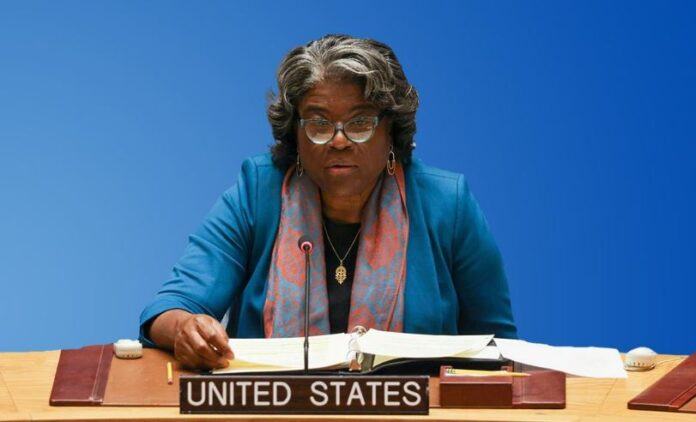Ambassador Linda Thomas-Greenfield
U.S. Representative to the United Nations
New York, New York
February 22, 2023
AS DELIVERED
Thank you very much, Madam President. And let me thank Deputy Special Representative Gbeho, Special Representative Souef, as well as Executive Director Ms. Bahous, for your briefings and your insightful presentations today. I would also like to welcome the Somali PR’s presence in the room today.
Last month, I had the opportunity to visit Somalia to review the humanitarian, stability, and security situations. And I do want to thank Ms. Gbeho for her support during my mission, as well as Special Representative Souef, both of whom I met with there.
Let me start with security, and some good news. Thanks to the bravery of Somalia’s security forces and citizens, over 70 towns in Hirshabelle and Galmudug have been liberated from al-Shabaab’s brutal rule since last summer.
Unfortunately, lives were lost in the process. We mourn the Somali people killed in the struggle to free their country from terrorism, like Deputy Commander of the Danab Major Hassan Tuure. His sacrifice, and that of others like him, reinforces the U.S. commitment to support Somali-led efforts to defeat al-Shabaab and provide security to the people of Somalia.
So, we welcome the recent commitment by Somalia and its neighbors to expand operations against al-Shabaab further into southern Somalia. And we strongly support and call on other international partners to help meet Somalia’s force generation needs. Stability, which is of course directly tied to security, remains a challenge in Somalia. Delivering timely and balanced stabilization interventions to newly liberated territory is imperative to bring security and relief to the Somali people in these areas.
UNSOM has a critical role to support the Federal Government of Somalia’s planning and coordination of stabilization efforts in response to operations. We appreciate UNSOM’s efforts to continue highlighting the need for long-term security sector reform, rule of law-based approaches to security, and good governance. These efforts will pave the way for lasting peace and security in Somalia.
We still support the federal government’s stated goal of ending ATMIS by the end of 2024. We expect drawdown plans will be coordinated with Somali officials, in line with Somali-defined security priorities on the ground. But ATMIS has played a key role in the ongoing Somali-led operations against al-Shabaab. So, in the meantime, we urge ATMIS to continue to provide the necessary support in close collaboration with our Somali partners.
The United States also welcomes progress toward federalism and political reconciliation. We congratulated the federal government and those federal member states who have come to agreement on the national security architecture and a national justice sector framework. We similarly welcome the agreement reached on parliamentary and presidential elections in South West state.
But we are still gravely concerned, however, with the violence in Laascaanood, particularly the indiscriminate shelling of civilians. We call for an immediate de-escalation of violence, the protection of civilians, unimpeded humanitarian access, and for tensions to be resolved peacefully through dialogue.
Finally, I want to talk about the drought – and the potential for famine again in Somalia. Famine is the ultimate failure of the international community. In a world abundant with food, entire communities should never have to starve to death. This Council cannot sit here and accept that failure.
Since 2022, the United States has provided more than $2.5 billion of lifesaving assistance to the Horn of Africa – 1.3 billion of that went directly to Somalia. Our funding last year accounted for more than 80 percent of the World Food Program’s emergency operations in the region. We delayed the onset of famine. But it was only a delay.
On my recent trip to Mogadishu, I announced the United States will provide another $40 million to Somalia. This funding will address extreme food gaps and combat the outbreak of deadly diseases.
But starting this April, the risk of famine will return. According to the UN’s own figures, without contributions from other donors, critical food and nutrition assistance supporting 4.6 million people in Somalia will end in April. We all just heard the call from Ms. Gbeho.
And I was clear in Somalia, and I will be clear with all of you here: The United States cannot continue to do this alone. This is a collective responsibility. I am calling on the international community – especially countries in the region, and countries with the means to give more – to heed the call of humanity.
Amidst this crisis, it has been devastating to watch some traditional donors cut down their humanitarian budgets. We cannot slash or even merely sustain our aid budgets. We must increase our funding in the year ahead. We must turn this famine postponement into a cancelation. And that will require more countries to contribute. More countries to give, both bilaterally and multilaterally.
So, I am appealing to all of you, my colleagues around the table, on this today. Let’s be ambitious. Let’s fight this famine. And let’s do it together. Let’s save lives.
Madam President, before ending, let me note our continued focus on the situation in Türkiye and Syria where they experience another earthquake less than 24 hours ago. Let me express my condolences on the devastation and loss of more lives.
Thank you, Madam President.


